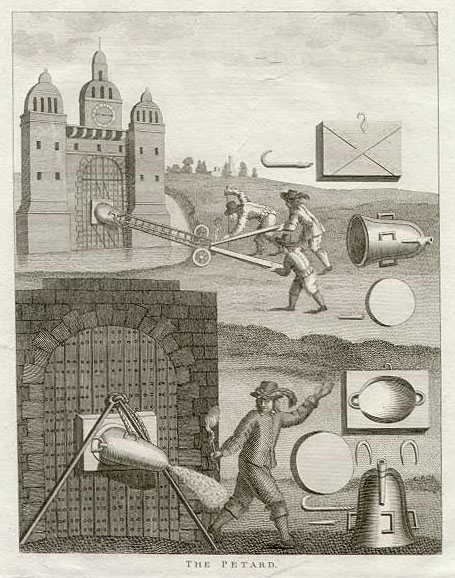1. "Hoisted by my own petard"
What does it mean to be hoisted by ones own petard? First of all, what is a petard? The word itself is of French origin. A petard is a sixteenth century explosive device used to destroy doors or walls, so as to grant the user entrance to a given fortification. The petard was attached to a wall or door and then set off, meant to blow a hole in the fortification so that troops could enter. The device was dangerous and unpredictable such that occasionally, one could be injured or blown back by the explosion, hence, being 'hoisted by ones own petard'. Therefore, the phrase refers to the irony of being hurt or mistreated by your own attempt to hurt or mistreat someone else.

2. Chairman of the Board
A Chairman of a Board is the head of a meeting or committee, or someone who presides over a board of directors. What is the historic origin of the title? It goes back to Medieval England, when land owners employed a whole team of people to work their land and take care of their other endeavors. Land owners would build a large, communal house for all of their employees, where everyone would eat communally in a great hall regardless of status. People were very aware of hierarchy at that time in history, so the head of the entire household would sit at the largest table in the great hall, at the focal point of the room. In the 16th century, a table was called a board (Latin Tabula, or board). The most important man would sit at the head at the best table and he was the only one who sat at a chair instead of a stool. Hence, he was called the 'chair-man of the board'.
Historian Dr. Lucy Worsley explains this in the History of the Home documentary:
3. Gobsmacked: A British slang, and an adjective meaning 'very shocked or surprised'. The word dates back to the 1980's and refers to the shock of suddenly being punched in ones mouth, or the act of covering ones mouth in response to a sudden surprise. A 'gob' is is the Gaelic Scottish word for 'mouth'.
Oh look they made a nail polish colour called Gobsmacked....

Other sources: Wikipedia, oxford dictionaries, Butter London
No comments:
Post a Comment